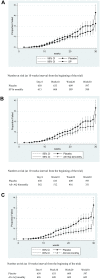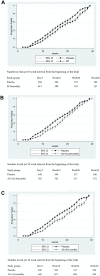Seasonal intermittent preventive treatment for the prevention of anaemia and malaria in Ghanaian children: a randomized, placebo controlled trial
- PMID: 19098989
- PMCID: PMC2602973
- DOI: 10.1371/journal.pone.0004000
Seasonal intermittent preventive treatment for the prevention of anaemia and malaria in Ghanaian children: a randomized, placebo controlled trial
Abstract
Background: Malaria and anaemia are the leading causes of morbidity and mortality in children in sub-Saharan Africa. We have investigated the effect of intermittent preventive treatment with sulphadoxine-pyrimethamine or artesunate plus amodiaquine on anaemia and malaria in children in an area of intense, prolonged, seasonal malaria transmission in Ghana.
Methods: 2451 children aged 3-59 months from 30 villages were individually randomised to receive placebo or artesunate plus amodiaquine (AS+AQ) monthly or bimonthly, or sulphadoxine-pyrimethamine (SP) bimonthly over a period of six months. The primary outcome measures were episodes of anaemia (Hb<8.0 g/dl) or malaria detected through passive surveillance.
Findings: Monthly artesunate plus amodiaquine reduced the incidence of malaria by 69% (95% CI: 63%, 74%) and anaemia by 45% (95% CI: 25%,60%), bimonthly sulphadoxine-pyrimethamine reduced the incidence of malaria by 24% (95% CI: 14%,33%) and anaemia by 30% (95% CI: 6%, 49%) and bimonthly artesunate plus amodiaquine reduced the incidence of malaria by 17% (95% CI: 6%, 27%) and anaemia by 32% (95% CI: 7%, 50%) compared to placebo. There were no statistically significant reductions in the episodes of all cause or malaria specific hospital admissions in any of the intervention groups compared to the placebo group. There was no significant increase in the incidence of clinical malaria in the post intervention period in children who were >1 year old when they received IPTc compared to the placebo group. However the incidence of malaria in the post intervention period was higher in children who were <1 year old when they received AS+AQ monthly compared to the placebo group.
Interpretation: IPTc is safe and efficacious in reducing the burden of malaria in an area of Ghana with a prolonged, intense malaria transmission season.
Trial registration: ClinicalTrials.gov NCT00119132.
Conflict of interest statement
Figures




References
-
- Murphy SC, Breman JG. Gaps in the childhood malaria burden in Africa: cerebral malaria, neurological sequelae, anaemia, respiratory distress, hypoglycaemia and complications of pregnancy. American Journal of Tropical Medicine and Hygiene. 2001;64(1–2 suppl):57–67. - PubMed
-
- Dicko A, Sagara S, Sissoko MS, Guindo O, Diallo ABI, et al. Impact of intermittent preventive treatment with sulfadoxine pyrimethamine targetting the transmission season on the incidence of clinical malaria in children of 6 months to 10 years in Kambila, Mali. Abstract of the 53rd annual meeting of American Journal of Tropical Medicine and Hygiene. American Journal of Tropical Medicine and Hygiene. 2004;71(suppl):6.
-
- Cisse B, Sokhna C, Boulanger D, Millet J, Ba EH, et al. Seasonal intermittent preventive treatment with artesunate and sulfadoxine-pyrimethamine for prevention of malaria in Senegalese children: a randomised, placebo-controlled, double-blind trial. Lancet. 2006;367:659–667. - PubMed
-
- Kweku M. Efficacy of seasonal intermittent preventive treatment in children: a randomised placebo control trial. PhD thesis 2007
Publication types
MeSH terms
Substances
Associated data
LinkOut - more resources
Full Text Sources
Medical
Research Materials

